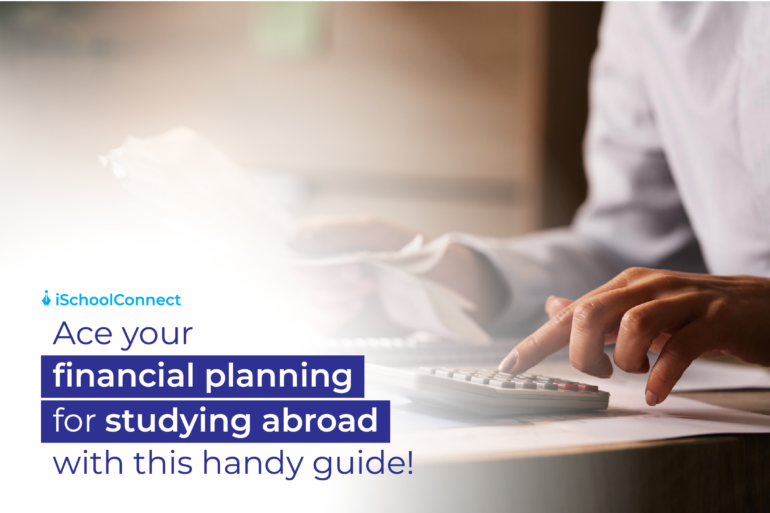Table of Contents
Managing financial budget while studying abroad
Studying abroad is a dream come true for many students, offering the chance to live in new cultures, gain a global perspective, and pursue quality education. While the prospect is exciting, it’s crucial to understand that the financial aspect of studying abroad goes beyond just tuition fees. If you do not have a study abroad budget the hidden costs can quickly add up and catch you off guard. In this blog, we’ll discuss the hidden costs of studying abroad and provide you with financial planning to ensure a successful and financially sound international education journey.
What is a study abroad budget?
It is a breakdown of all the funds that you bring with you while studying abroad. It assists you in financial planning your outgoings so that you do not spend more than you have.
What should your student budget include?
One of the simplest ways to organize your study abroad budget is to divide your expenses into essential and non-essential expenses.
Essential expenditures are things or services that you must purchase. These necessities should be a priority in your budget.
Non-essential expenses are products or services that you like but do not require.
The following are the essential and non-essential costs that most overseas students face-
| Essential costs | Non-essential costs |
| Tuition fees | Clothing |
| Accommodation costs | Haircuts & beauty products |
| Utilities (gas, electricity, water) | Gym membership |
| Groceries | Dining out |
| Mobile phone, Wi-Fi, TV | Household supplies |
| Insurance (health and contents) | Nights out (club entry, alcohol, takeaways, taxis) |
| Visa application fee, expenditure for air ticket | Music and film subscription services (Amazon Prime, Netflix, Apple TV, Spotify) |
| Books and academic supplies | Hobbies (cinema tickets, music gigs, games consoles) |
| Transport (buses, trains, fuel, car insurance) | Sports club membership fees and kit |
How to calculate a student budget?

- Determine your overall income, which includes any loans, scholarships, grants, part-time work, savings, and donations from parents or guardians.
- Subtract the total cost of your essential expenses from your overall income and plan your expenditures accordingly.
- Determine your disposable income. This is the amount of money you can afford to spend on non-essential things and services.
Tip- Including a little emergency reserve in your budget is a wise decision. Hopefully, you’ll never need to use this fund, but it might cover the cost of emergency medical care or unexpected travel home.
Top 5 money-saving tips
Here are the best five money saving tips every student should follow while studying abroad.
Find the cheapest mode of transportation
Take buses instead of trains, rent a bike, and book flights in advance. If you travel frequently, you should invest in facilities such as a multi-use travel card.
Seek financial assistance
You can opt for a range of financial assistance packages. There are various scholarships, grants, and bursaries available in international universities. You might strike gold if you do some study on financial planning.
Earn while you learn
Consider taking on a part-time job if you’re starting to feel the strain. This is a good method to supplement your income but don’t let it interfere with your studies.
Take advantage of student discounts
Various stores, restaurants, and entertainment venues provide student bargains and discounts. You should always carry your student ID with you when you pay.
Make everything from scratch
Eating out on a frequent basis may lead to overspending. Home cooking is an excellent method to save money while also enhancing your cooking skills. Consider purchasing frozen rather than fresh items and supermarket lines over expensive brands to save even more money.
Hidden costs for studying abroad

We’ll go over the various neglected charges and hidden costs you should be aware of, as well as how they might add up to the overall costs. These hidden costs are-
Administrative costs at the university
While many colleges provide free degree programs, they frequently include administrative fees. These can include books or documents connected to your enrollment.
Even though administrative charges are not too high per semester, they add up to the overall price of your studies and should be taken into consideration.
Currency exchange and transfer fees
If you’re sending money abroad to meet expenses, keep in mind that currency conversion and transfer fees can quickly mount up.
Banking fees
If you use your home bank’s debit or credit card overseas, you may be charged international transaction fees or ATM withdrawal costs. It’s a good idea to look at banking providers with lower or no foreign transaction costs.
Cultural activities and events
Attending cultural events, extracurricular activities, and outings can be enlightening, but they can also be costly.
Communication costs
If you use your home phone plan, staying in touch with friends and family back home may incur expenses for international calls, messaging applications, or data roaming.
Telecommunications companies charge varying international rates. They also limit the number of calls or data you can use abroad. Review your personal subscription and ensure you understand the details outlining how to utilize your mobile phone plan overseas.
Key takeaways
- Studying abroad offers incredible opportunities but requires careful financial planning to avoid being blindsided by hidden costs.
- Calculate your budget by subtracting your essential expenses from your income. The remaining amount is your disposable income for non-essential items.
- Practical tips such as using cheaper transportation options, seeking financial aid, part-time work, student discounts, and cooking at home can significantly help reduce expenses.
Was this blog post a valuable read for you? Share your insights with us in the comments section. Your thoughts and experiences are important to us. For personalized guidance on your study abroad journey,financial planning feel free to contact us. We’re here to provide information on international education courses and universities.
Liked this blog? Read next: Flipkart Launchpad Internship Program – All you need to know
FAQs
Q1. Can I study abroad with a low budget?
Ans- Countries such as Germany, Taiwan, and France provide great education at affordable cost. Choosing a country with a low cost of living to study abroad helps in managing finances wisely and lowers the burden of student loans or financially relying on their families.
Q2. Which is the cheapest country to study abroad?
Ans- Norway, Taiwan, Poland, Mexico, and Germany are the top five affordable study-abroad destinations.
Q3. What is the average budget for study abroad?
Ans- Students must spend roughly Rs 30-32 lakh each year studying overseas, regardless of country. Tuition fees of Rs 15-20 lakh and living expenses of Rs 10-12 lakh would be included as an additional expense.






